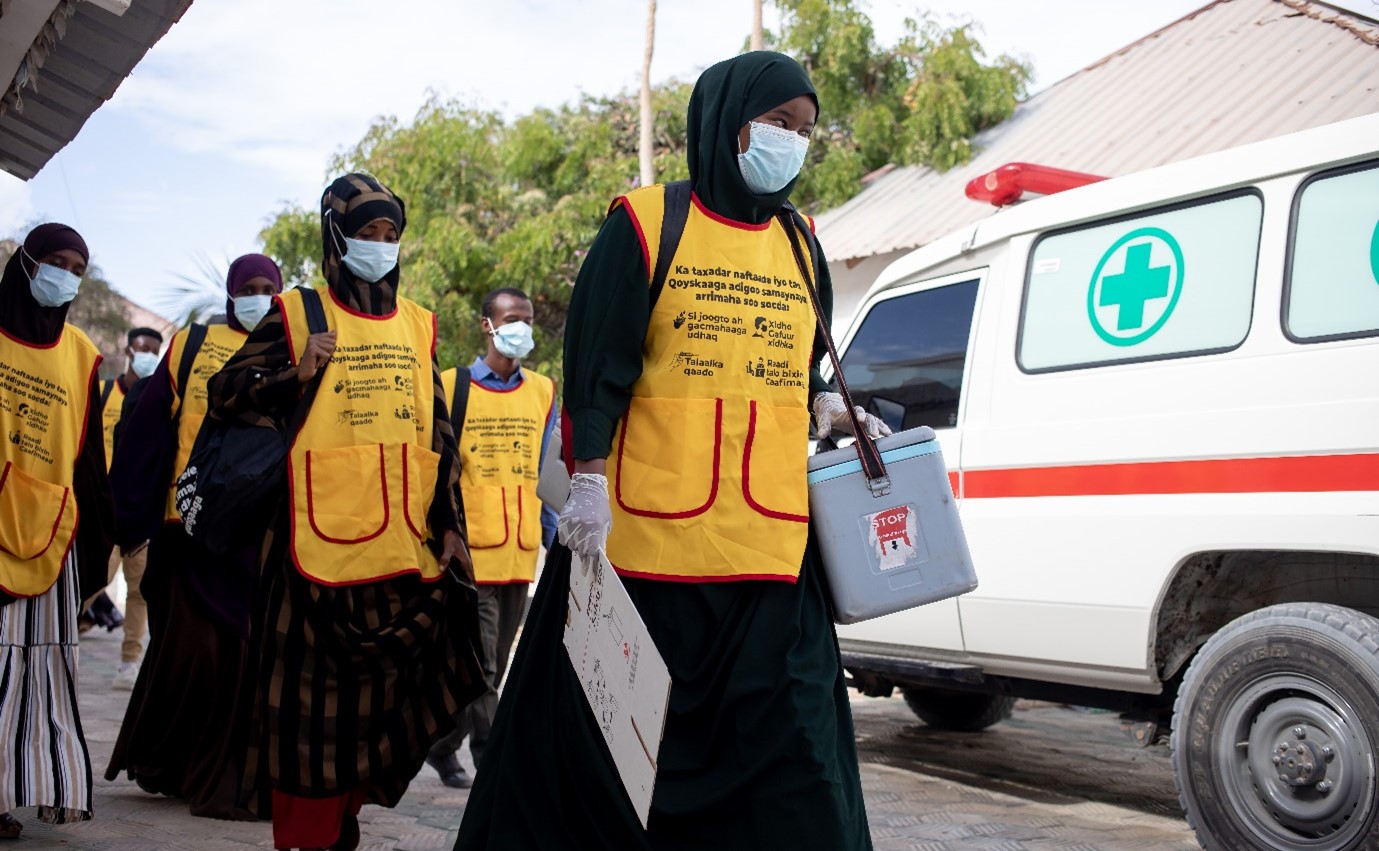 Health workers prepared to visit a camp for internally displaced persons in Kismayo, Somalia. Credit: WHO/Ismail Taxte
Health workers prepared to visit a camp for internally displaced persons in Kismayo, Somalia. Credit: WHO/Ismail Taxte
Mogadishu, 12 December 2022 – Since 2014, 12 December has been commemorated as Universal Health Coverage Day, marking the day in 2012 when the United Nations unanimously endorsed a resolution urging all countries to accelerate progress toward universal health coverage (UHC). The theme for 2022 is “Build the World We Want: A Healthy Future for All.”
UHC means that all people everywhere can access the quality health services they need, without suffering financial hardship. It is rooted in 3 principles: equity of access, quality of services and financial protection. With the impact of COVID-19 which is estimated to have rolled-back 2 decades of global progress towards UHC and with humanitarian crises increasing around the world, advancing access to health for all remains crucial.
In Somalia, decades of conflict, recurrent climatic shocks and the COVID-19 pandemic have weakened the already-fragile health system and further exacerbated widespread poverty, underdevelopment and social and gender inequality. Currently, the country sits at the bottom of the UHC index, indicating that it has the lowest level of UHC in the world.
Building the world we want
To rectify the dire situation, the Somali Federal Government has started to implement a transformative agenda through its Essential Package of Health Services 2020 (EPHS), aimed at rebuilding its health system towards achieving UHC using primary health care services as the main entry point. In this regard, WHO has been supporting the strengthening of access to medical oxygen, by having procured pressure swing adsorption oxygen plants and installing solar-powered oxygen concentrators at hospitals across the country; improving surveillance activities, including through the deployment of community health workers and rapid response teams, as well as by enhancing the capacities of laboratories to test for epidemic-prone diseases; the procurement and distribution of essential medicines and supplies and developing infrastructure to ensure that health services are available to those who need them most.
The roll out of large vaccination campaigns across the country, integrated with other basic services, provide the opportunity to reach “zero dose children” and their underserved communities, with expansion of coverage of essential services – one step forward to deliver the EPHS.
Working in partnership with the government, United Nations sister agencies, donors and other stakeholders to deliver essential services in the short-term and build the capacity of the Somali health service in the longer term, the goal of ensuring that every family is able to access quality health care without falling into poverty is possible.
Leaving no one behind
Despite the above gains, Somalia is now in the grip of one of the worst droughts the country has seen in decades, putting further strain on the fragile health system. It is currently affecting 7.8 million people, 1.1 million of whom have been displaced from their homes, on top of the 2.5 million people already displaced.
The need for quality, accessible health services does not stop in emergency contexts – in fact, it increases. Not only are children missing out on essential lifesaving vaccinations, but a lack of access to health services can allow epidemic-prone diseases to rapidly circulate, with long-lasting consequences for individuals, communities and for the health of Somalia as a whole.
To overcome this challenge, WHO is working with Federal and State Ministries of Health as well as frontline health workers in an effort to ensure that no one is left behind and that progress made towards UHC is not lost. To achieve this, WHO has deployed community health workers and rapid response teams for community-based surveillance of epidemic-prone diseases, the provision of basic services, referring patients to health facilities, and risk communication and community engagement.
“A child born today in Somalia is about 16.5 times more likely to die before the age of 5, than a child born elsewhere,” said Dr Sk Md Mamunur Rahman Malik, WHO Representative and Head of Mission to Somalia. “Evidence shows that it is the most vulnerable and marginalized families who have the least access to health care. Universal health coverage is key to correcting this injustice. Moreover, fragile contexts like Somalia face multiple challenges in achieving UHC but the progress made in recent years show that it is possible. By strengthening the health system to withstand shocks and identify and respond to emerging health risks, as well as supporting the delivery of basic services including to the most vulnerable, we can build a healthy future for all.”
For additional information, please contact:
Kyle DeFreitas
External Relations Officer
This e-mail address is being protected from spambots. You need JavaScript enabled to view it
Fouzia Bano
Communications Officer
This e-mail address is being protected from spambots. You need JavaScript enabled to view it
Related links
WHO EMRO | Universal health coverage | Priority areas | Somalia site
Essential Package of Health Services (EPHS) Somalia, 2020 - Somalia | ReliefWeb




